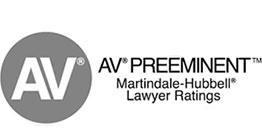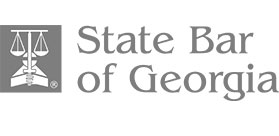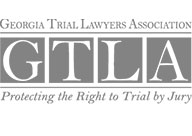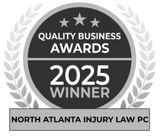If you were injured on your motorcycle in Georgia, you might already feel like you’re fighting an uphill battle. Why? Because of a stubborn, unfair stereotype that paints all riders as reckless.
This bias may influence the driver’s insurance company to reduce or deny your claim. Their investigation will scrutinize every detail of the crash, looking for any opening to shift the blame onto you. Our single focus is to dismantle that narrative with facts.
At North Atlanta Injury Law, we have years of experience protecting the rights of riders in Milton and across North Georgia. When you need a trusted Milton motorcycle accident lawyer, we are here to provide clear answers and fight for the justice you deserve.
Call us for a no-cost case review at (770)988-4000.
Milton Motorcycle Accident Guide
- Key Takeaways for Milton Motorcycle Accident Claims
- Why Do Riders in Milton Trust North Atlanta Injury Law?
- What Compensation Is Available After a Motorcycle Accident?
- What Are the Most Common Motorcycle Accident Injuries?
- How Georgia’s Fault Rules Can Impact Your Claim
- Where Do Motorcycle Accidents Occur in Milton and North Fulton?
- How Do You Prove the Other Driver Was at Fault?
- Key Georgia Laws Affecting Your Claim
- Dealing With the At-Fault Driver’s Insurance Company
- Actions to Take from Home to Strengthen Your Case
- Your Questions About Milton Motorcycle Accident Claims Answered
- Let North Atlanta Injury Law Protect Your Rights as a Rider
Key Takeaways for Milton Motorcycle Accident Claims
- Riders face unfair bias from insurers. Insurance companies often try to shift blame onto motorcyclists. Building a strong, evidence-backed case is key to recovering full compensation.
- Georgia law limits recovery if you’re 50% or more at fault. Even partial fault can reduce your payout. The other driver’s insurer will look for anything to pin on you—so legal representation matters.
- Helmet use affects your recovery, not fault. You can still file a claim if you weren’t wearing a helmet. But insurers may argue it made your injuries worse, which could lower the amount you recover for head trauma.
Why Do Riders in Milton Trust North Atlanta Injury Law?
After a serious injury, the last thing you need is to feel like just another case file. Many law firms operate on a high-volume model, where cases are passed between paralegals and case managers. This assembly-line approach rarely serves the person who is actually hurt. We do things differently. Our firm intentionally limits its caseload to give you direct, personalized attention. When you call with a question, you can speak directly with your attorney. This open line of communication means you are always aware of what is happening with your case and the strategy behind it.
Our Commitment to You:
- No Win, No Fee Guarantee: You pay us nothing unless and until we recover compensation for you. This is our contingency fee promise.
- Free Case Review: We will listen to your story and give you an honest, straightforward assessment of your legal options with no obligation.
- We Handle the Headaches: Our team manages all communication with insurance companies, directs evidence collection, and deals with the endless paperwork.
What Compensation Is Available After a Motorcycle Accident?
The purpose of a personal injury claim is to make you financially whole again. We pursue the maximum compensation available under Georgia law by meticulously documenting all of your losses. These damages are typically sorted into three categories:
Economic Damages
These are the tangible, calculable costs linked directly to the accident.
- All Medical Expenses: This includes every bill from the emergency room, surgeons, hospital stays, physical therapists, medication, and any future medical care you are expected to need.
- Lost Income and Earning Capacity: We calculate the wages you have already lost. If your injuries affect your ability to earn a living in the future, we perform an analysis to project those long-term losses.
- Property Damage: This covers the cost to repair your motorcycle or its fair market value if it was declared a total loss.
Non-Economic Damages
These damages compensate you for the intangible ways the injury has altered your life. While they don’t come with a price tag, their impact is just as real.
- Pain and Suffering: This is compensation for the physical pain and emotional distress you have endured because of the accident and your injuries.
- Loss of Enjoyment of Life: If your injuries prevent you from participating in hobbies and activities you once loved—riding, hiking, or playing with your children—you may be compensated for this loss.
How Is “Pain and Suffering” Calculated?
There is no simple calculator for pain and suffering, but two common methods are used to arrive at a reasonable figure:
- The Multiplier Method: This is the most common approach. Your total economic damages (like medical bills and lost wages) are multiplied by a number, typically between 1.5 and 5. A lower multiplier might be used for minor injuries, while a higher one is reserved for severe, life-altering injuries.
- The Per Diem Method: This method assigns a daily dollar amount for each day you live with the pain and limitations from your injuries. The daily rate is then multiplied by the number of days from the accident until you reach maximum medical recovery.
What Are the Most Common Motorcycle Accident Injuries?
The lack of physical protection makes riders particularly vulnerable to specific types of severe injuries.
- Traumatic Brain Injuries (TBI): Even with a helmet, the force of an impact can cause the brain to strike the inside of the skull, leading to concussions or more severe TBIs. These injuries can have long-lasting cognitive and emotional effects.
- Spinal Cord Injuries: Damage to the spinal cord can result in partial or full paralysis, permanently altering a person’s life. The location of the injury on the spine determines the extent of functional loss.
- Road Rash: This occurs when a rider skids across the pavement. Severe cases can involve deep abrasions, nerve damage, and a high risk of infection, sometimes requiring skin grafts.
- Lower-Extremity Injuries: A rider’s legs and feet are highly exposed. Fractures of the femur, tibia, and fibula are common, as are serious ankle and foot injuries. According to the CDC, 30% of non-fatal motorcycle injuries affect the rider’s legs and feet.
- Internal Injuries: The blunt-force trauma of a crash can cause internal bleeding and organ damage, which may not be immediately apparent at the scene.
How Georgia’s Fault Rules Can Impact Your Claim
Georgia operates under a “modified comparative fault” rule. It’s a legal concept that simply means your compensation can be reduced by your percentage of fault. If you are found 50% or more at fault, you cannot recover any compensation at all. A key part of our job is to use evidence to counter any attempts to place unfair blame on you.
Where Do Motorcycle Accidents Occur in Milton and North Fulton?
Milton’s mix of suburban streets and winding rural roads creates distinct challenges for motorcyclists. Data consistently shows that Fulton County has one of the highest numbers of motorcycle crashes and fatalities in Georgia.
Common Accident Hotspots and Scenarios:
- Busy Intersections: High-traffic areas along State Route 9 (Alpharetta Highway) and State Route 140 (Arnold Mill Road) are frequent sites of accidents. Left-turn collisions are particularly common, where drivers misjudge a motorcycle’s speed and turn directly into its path.
- Winding Rural Roads: Roads like Hopewell Road, Birmingham Highway, and Freemanville Road feature curves and hills that become hazardous when drivers are distracted or speeding. Poor road conditions, like loose gravel or potholes, pose a much greater risk to a motorcycle than to a passenger car.
- High-Speed Commuter Routes: With GA-400 nearby, many drivers are traveling at high speeds. Unsafe lane changes are a primary cause of motorcycle accidents, as drivers frequently fail to check their blind spots for a smaller vehicle.
How Do You Prove the Other Driver Was at Fault?
Building a strong claim is about gathering objective evidence to show what really happened. A police report is a starting point, but it is not the final word. We conduct a thorough, independent investigation to establish the facts. This process includes:
- Collecting Physical Evidence: We secure photos and videos from the scene, examine damage to both vehicles, and analyze skid marks and debris fields to reconstruct the sequence of events.
- Interviewing Witnesses: Independent witnesses can provide unbiased accounts that often clarify disputed facts and counter the other driver’s version of the story.
- Obtaining Expert Analysis: In some cases, we work with accident reconstruction experts. These specialists use physics and engineering principles to create a scientific model of the crash, which can definitively show how factors like speed and driver action caused the collision.
- Subpoenaing Records: We can obtain cell phone records to determine if the other driver was texting or talking on the phone at the time of the crash, providing clear evidence of distraction.
Key Georgia Laws Affecting Your Claim
- The Statute of Limitations: In Georgia, you generally have two years from the date of the accident to file a personal injury lawsuit. This deadline is absolute; if you miss it, you lose your right to seek compensation forever.
- Georgia’s Helmet Law: Georgia law (O.C.G.A. § 40-6-315) requires all motorcycle riders and passengers to wear a helmet. While failing to wear one does not stop you from filing a claim, the defense may argue that it contributed to your head injuries and should reduce your compensation.
- Lane Splitting is Illegal: Riding between lanes of traffic is not permitted in Georgia and can be used to assign fault to the motorcyclist.
Dealing With the At-Fault Driver’s Insurance Company
Shortly after the crash, an insurance adjuster for the other driver will likely contact you. It may seem like a positive step, but their job is to first and foremost protect their company’s financial interests. Insurance companies are businesses, which means they must balance paying fair claims with remaining profitable. The claims process is long, tedious, and filled with paperwork. It’s easy to get frustrated and accept a lower offer as bills pile up higher and higher. You do not have to face this process alone. Our team takes over all communication, building a case based on evidence to put you in the strongest possible negotiating position. Here’s what you should be aware of:
- Don’t Give a Recorded Statement: Adjusters will ask to record your conversation. We strongly advise against this. Your words can be taken out of context and used later to argue you admitted fault. Let your attorney do the talking.
- Be Wary of Early Offers: An insurer might make a quick settlement offer before the full extent of your injuries is known. Accepting it closes your claim for good, even if your condition worsens and you need more medical treatment.
- Let Us Handle the Details: We manage the deadlines, paperwork, and negotiations, allowing you to focus on your health.
Actions to Take from Home to Strengthen Your Case
While we manage the legal work, you can take several steps at home to protect the value of your claim.
- Follow Your Doctor’s Treatment Plan: Attend all medical appointments, take your medications, and complete your physical therapy. This creates a clear medical record of your injuries and demonstrates that you are committed to your recovery. Gaps in treatment give an insurance company an opening to argue your injuries are not as serious as you claim.
- Keep a Journal: Each day, write down how you feel. Note your pain levels, any difficulties with daily activities (like sleeping or dressing), and how the injuries are affecting your mood and life. This personal record can become compelling evidence of your pain and suffering.
- Track All Expenses: Keep every receipt and bill related to the accident. This includes pharmacy co-pays, mileage for driving to doctor’s appointments, and any items you had to buy to accommodate your injuries.
- Stay Off Social Media: Do not post anything about the accident, your injuries, or your activities. An innocent photo of you at a family gathering could be misinterpreted by the defense to argue that your injuries are not as limiting as you claim.
Your Questions About Milton Motorcycle Accident Claims Answered
What if the driver who hit me was uninsured or underinsured?
You may still be able to recover compensation through your own insurance policy’s Uninsured/Underinsured Motorist (UM/UIM) coverage. This is optional coverage in Georgia, but insurers must offer it to you. If you have it, it can be used to cover your losses when the at-fault driver has no insurance or not enough to pay for all your damages. We’ll review your policy to determine your options.
Who pays my medical bills while the case is ongoing?
In Georgia, you are responsible for ensuring your medical bills are paid while your case is pending, even though the other driver is at fault. Typically, you would use your health insurance or any Medical Payments (MedPay) coverage on your auto policy. If you do not have coverage, some medical providers will agree to treat you on a “lien,” which is a promise to pay them out of your final settlement. The at-fault driver’s insurance company does not pay your bills as you go; they pay in a lump sum when the case settles.
How long will my motorcycle accident case take to resolve?
The timeline varies depending on the specifics of your case. A straightforward claim with clear fault and minor injuries might settle in a few months. A case involving very serious injuries or a dispute over who was at fault could take over a year, especially if it proceeds to trial. Our objective is always to resolve your case for its full value as efficiently as possible, without rushing into an inadequate settlement.
Do I have a claim if a road hazard in Milton, like a pothole, caused my crash?
Yes, you might. If a government body, like the City of Milton or Fulton County, was negligent in maintaining the road, you could have a claim. These cases are different. They have much shorter deadlines and specific notification rules, known as an ante litem notice. You must formally notify a city of your claim within just six months of the incident. It is important to act very quickly in these situations.
Even if I wasn’t wearing a helmet, can the other driver still be 100% at fault for causing the crash?
Yes. A driver’s negligence—running a red light, for example—is what causes an accident. Not wearing a helmet does not cause the crash itself. However, as mentioned earlier, the defense will argue that the lack of a helmet made your head injuries worse. This could reduce the amount you recover for those specific injuries under Georgia’s comparative fault rule, but it does not erase the other driver’s responsibility for the collision.
The police report says I was partially at fault. Is my case over?
Absolutely not. A police report is an officer’s opinion based on an initial look at the scene; it is not the final word and is not admissible evidence in court. We conduct our own independent investigation. By gathering more detailed evidence, such as witness statements or analysis from an accident reconstructionist, we can often present a more accurate picture of what happened and challenge the officer’s initial conclusion.
Let North Atlanta Injury Law Protect Your Rights as a Rider
You deserve a legal team that understands what you are up against and knows how to counter the bias against riders. Let us handle the fight for fair compensation while you focus on healing.
For a free, no-obligation consultation about your Milton motorcycle accident, call us today at (770)988-4000. When you work with an experienced Milton personal injury lawyer, you gain an advocate who will protect your rights and fight for the compensation you deserve.
North Atlanta Injury Law PC – Milton Office
Address: 12610 Crabapple Road Suite 201 Milton, GA 30004
Contact No: (770)988-4000








